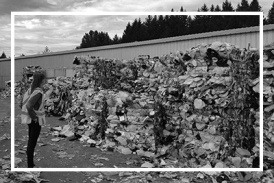Data Quality Co-op launches industry’s first independent clearinghouse to measure and benchmark data quality
Platform introduces shared quality signals, supplier benchmarking, and real-time analytics to help the insights industry make smarter data decisions
SALT LAKE CITY, UT, UNITED STATES, April 14, 2025 /EINPresswire.com/ -- Data Quality Co-op (DQC), the insights industry’s first independent clearinghouse for data quality measurement, today announced the formal launch of its platform. Designed to help buyers and suppliers of first-party data evaluate and improve the quality of their research inputs, the DQC platform aggregates, analyzes, and benchmarks quality signals across studies, suppliers, and time.
The DQC platform addresses the data quality challenges, inconsistencies and disruptions facing the market research industry by introducing a shared infrastructure for measuring data integrity—before a study even begins. DQC augments traditional survey-specific quality management techniques with a persistent, industry-wide data quality framework inspired by successful clearinghouses in finance, advertising, and consumer reviews. As more organizations contribute quality signals, the platform becomes smarter, creating a self-reinforcing system that enhances research outcomes for all participants.
"It's becoming increasingly difficult to determine if data is collected from qualified people,” said Bob Fawson, Co-Founder of Data Quality Co-op. “We created DQC to give the industry a common language, independent standards for quality, and proactive solutions—so that everyone from procurement teams to researchers and suppliers can operate with more confidence and less guesswork.”
Since early development, DQC has partnered with forward-thinking organizations to shape and validate its approach. The result is a comprehensive platform that delivers real-time insights into the quality of both respondents and sample providers.
Key platform capabilities include:
- Shared quality signals: Aggregates in-survey and outside-survey data from across the market research industry (e.g., bot detection, open-end analysis, identity resolution) to create a unified view of quality.
- Supplier benchmarking: Tracks and compares supplier performance over time, helping buyers optimize sourcing strategies and helping suppliers validate their credibility.
- Custom filters and dashboards: Users can create and save “My Views” to segment data by supplier, disposition, project, or time period—streamlining analysis and reporting.
- Data exports and flexibility: Survey-level exports allow for granular offline analysis, while new toggles make it easy to include or exclude specific suppliers from views.
- Automated vendor scorecards: Delivers standardized reporting that supports procurement, quality audits, and long-term vendor management.
Early adopters of the platform report finding significant value in the ability to independently evaluate supplier quality in real time, reducing time spent evaluating data quality and reducing disrupted fieldwork. The DQC platform provides the visibility needed to make decisions with confidence—and hold partners accountable to the highest data quality standards. This capability is already transforming how these early adopters manage their data for more reliable, accurate insights.
About Data Quality Co-op
Data Quality Co-op (DQC) is an independent first-party data quality clearinghouse. We transform how buyers and suppliers of first-party data measure, understand and manage the quality of their data. Our platform offers continuous quality measurement and real-time quality certification by aggregating, analyzing, and benchmarking data quality signals. Together with our clients, we are shaping the future of fast, reliable data-driven insights. Headquartered in Salt Lake City, Utah, our mission is to ensure each business decision, marketing campaign or AI model is driven by data that’s high-quality, high-value and perfectly suited for its purpose. For more information, visit www.dataqualityco-op.com.
Marie Melsheimer
Andre Marketing & Design
marie@andremktg.com
Visit us on social media:
LinkedIn
Legal Disclaimer:
EIN Presswire provides this news content "as is" without warranty of any kind. We do not accept any responsibility or liability for the accuracy, content, images, videos, licenses, completeness, legality, or reliability of the information contained in this article. If you have any complaints or copyright issues related to this article, kindly contact the author above.
Huntington’s Disease: Charting a New Path with Disease-Modifying Therapies and Strategic Innovation
Paramount Wellness Retreat Addresses the Link Between ADHD and Addiction with Specialized Dual Diagnosis Treatment
Aspire Systems wins Silver Stevie® Award in 2025 American Business Awards®
Kalendarium
Więcej ważnych informacji
 Jedynka Newserii
Jedynka Newserii

 Jedynka Newserii
Jedynka Newserii

Handel

Ze względu na różnice w cenach surowce wtórne przegrywają z pierwotnymi. To powoduje problemy branży recyklingowej
Rozporządzenie PPWR stawia ambitne cele w zakresie wykorzystania recyklatów w poszczególnych rodzajach opakowań. To będzie oznaczało wzrost popytu na materiały wtórne pochodzące z recyklingu. Obecnie problemy branży recyklingu mogą spowodować, że popyt będzie zaspokajany głównie przez import. Dziś do dobrowolnego wykorzystania recyklatów nie zachęcają przede wszystkim ceny – surowiec pierwotny można kupić taniej niż ten z recyklingu.
Przemysł spożywczy
Rośnie presja konkurencyjna na unijne rolnictwo. Bez rekompensat sytuacja rolników może się pogarszać

Rolnictwo i żywność, w tym rybołówstwo, są sektorami strategicznymi dla UE. System rolno-spożywczy, oparty na jednolitym rynku europejskim, wytwarza ponad 900 mld euro wartości dodanej. Jego konkurencyjność stoi jednak przed wieloma wyzwaniami – to przede wszystkim eksport z Ukrainy i niedługo także z krajów Mercosur, a także presja związana z oczekiwaniami konsumentów i Zielonym Ładem. Bez rekompensat rolnikom może być trudno tym wyzwaniom sprostać.
Transport
Infrastruktury ładowania elektryków przybywa w szybkim tempie. Inwestorzy jednak napotykają szereg barier

Liczba punktów ładowania samochodów elektrycznych wynosi dziś ok. 10 tys., a tempo wzrostu wynosi ok. 50 proc. r/r. Dynamika ta przez wiele miesięcy była wyższa niż wyniki samego rynku samochodów elektrycznych, na które w poprzednim roku wpływało zawieszenie rządowych dopłat do zakupu elektryka. Pierwszy kwartał br. zamknął się 22-proc. wzrostem liczby rejestracji w ujęciu rocznym, ale kwiecień przyniósł już wyraźne odbicie – o 100 proc.
Partner serwisu
Szkolenia

Akademia Newserii
Akademia Newserii to projekt, w ramach którego najlepsi polscy dziennikarze biznesowi, giełdowi oraz lifestylowi, a także szkoleniowcy z wieloletnim doświadczeniem dzielą się swoją wiedzą nt. pracy z mediami.









.gif)

 |
| |
| |
|